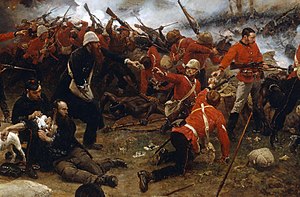Anglo-Zulu War
| Anglo-Zulu War | |||||||
|---|---|---|---|---|---|---|---|
 Detail of a painting depicting the Battle of Rorke's Drift |
|||||||
|
|||||||
| Belligerents | |||||||
|
|
Zulu Kingdom | ||||||
| Commanders and leaders | |||||||
|
|
Cetshwayo kaMpande Ntshingwayo Khoza Dabulamanzi kaMpande |
||||||
| Strength | |||||||
|
1st invasion:
17 cannons
2 Gatling guns |
35,000 | ||||||
| Casualties and losses | |||||||
| 1,902 killed 256 wounded |
6,930 killed | ||||||
1st invasion:
15,000–16,000
17 cannons
1 Gatling gun
1 rocket battery
2nd invasion:
25,000
The Anglo-Zulu War was fought in 1879 between the British Empire and the Zulu Kingdom. Following Lord Carnarvon's successful introduction of federation in Canada, it was thought that similar political effort, coupled with military campaigns, might succeed with the African kingdoms, tribal areas and Boer republics in South Africa. In 1874, Sir Henry Bartle Frere was sent to South Africa as High Commissioner for the British Empire to bring such plans into being. Among the obstacles were the presence of the independent states of the South African Republic and the Kingdom of Zululand and its army.
Frere, on his own initiative, without the approval of the British government and with the intent of instigating a war with the Zulu, had presented an ultimatum on 11 December 1878, to the Zulu king Cetshwayo with which the Zulu king could not comply. Bartle Frere then sent Lord Chelmsford to invade Zululand after this ultimatum was not met. The war is notable for several particularly bloody battles, including an opening victory of the Zulu at the Battle of Isandlwana, followed by the defeat of a large Zulu army at Rorke's Drift by a small force of British troops. The war eventually resulted in a British victory and the end of the Zulu nation's dominance of the region.
By the 1870s the British Empire had colonies in southern Africa bordering on various Boer settlements, native African kingdoms such as the Zulus, and numerous indigenous tribal areas and states. Various interactions with these followed an expansionist policy. Cape Colony had been formed after the Anglo–Dutch Treaty of 1814 permanently ceded the Dutch colony of Cape Town to Britain, and its territory expanded very substantially through the 1800s. The Colony of Natal was a British colony in south-eastern Africa that had been proclaimed a British colony on 4 May 1843 after the British government had annexed the Boer Republic of Natalia. Matters were brought to a head when three sons and a brother of the Zulu chief Sirayo organized a raid into Natal and carried off two women who were under British protection.
...
Wikipedia
